Housing summit focuses in on lack of affordable housing
In order to afford rent at one-third of a household’s monthly income, that household would need to make $5,292 a month or $63,504 a year. A single income would need to make 33 dollars an hour, while two people working the same schedule would need to make $16.53 an hour.
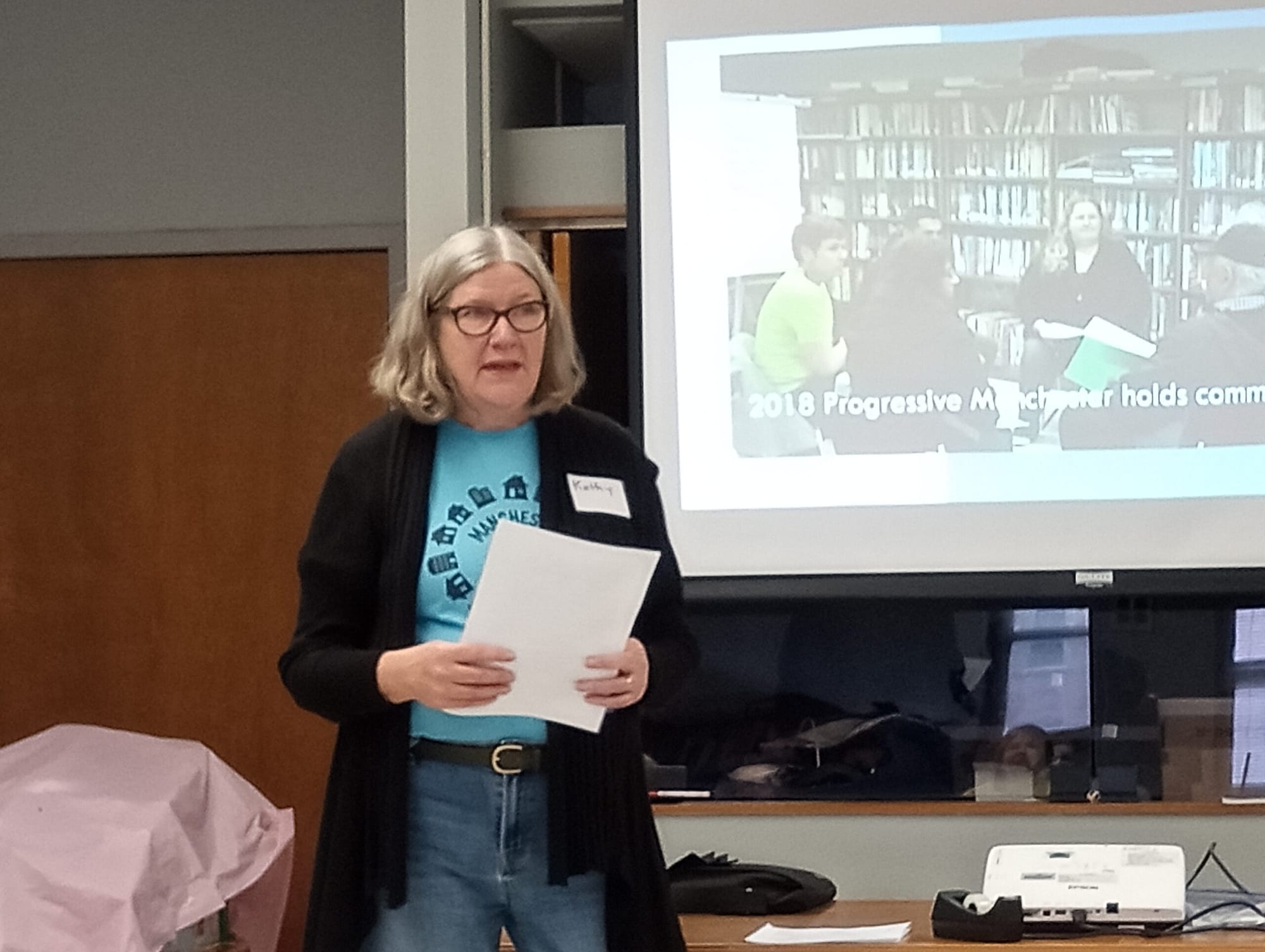

MANCHESTER, NH – The Manchester Housing Alliance held its first in-person group meeting since 2019. In March 2020, the group worked closely with Mayor Joyce Craig to formulate a task force which would examine potential barriers for affordable housing; shortly afterward, everything closed down due to COVID-19. Now, with the worst of the pandemic behind them, the group on Saturday morning hosted a public summit to discuss the city’s affordable housing crisis at the Winchell Room of the Manchester City Library on Pine Street.
Among those in attendance were Bryce Kaw-uh, Chairman of the Planning Board, Christine Fajardo, Alderman for Ward 4, Representative Don Bouchard, a Democrat representing Hillsborough District 11, Manchester NAACP president Dr. James McKim, disability rights advocates, as well as property owners and others.
The state’s crisis has been ongoing for a number of years, and is most commonly expressed by Manchester’s persistent struggles with homelessness. In September 2023, the New Hampshire Bulletin reported the crisis was “harming New Hampshire’s economy and its communities.” At the time, estimates for the median cost of a single-family home reached $499,000, while the median rent for a two-bedroom apartment reached $1,764.
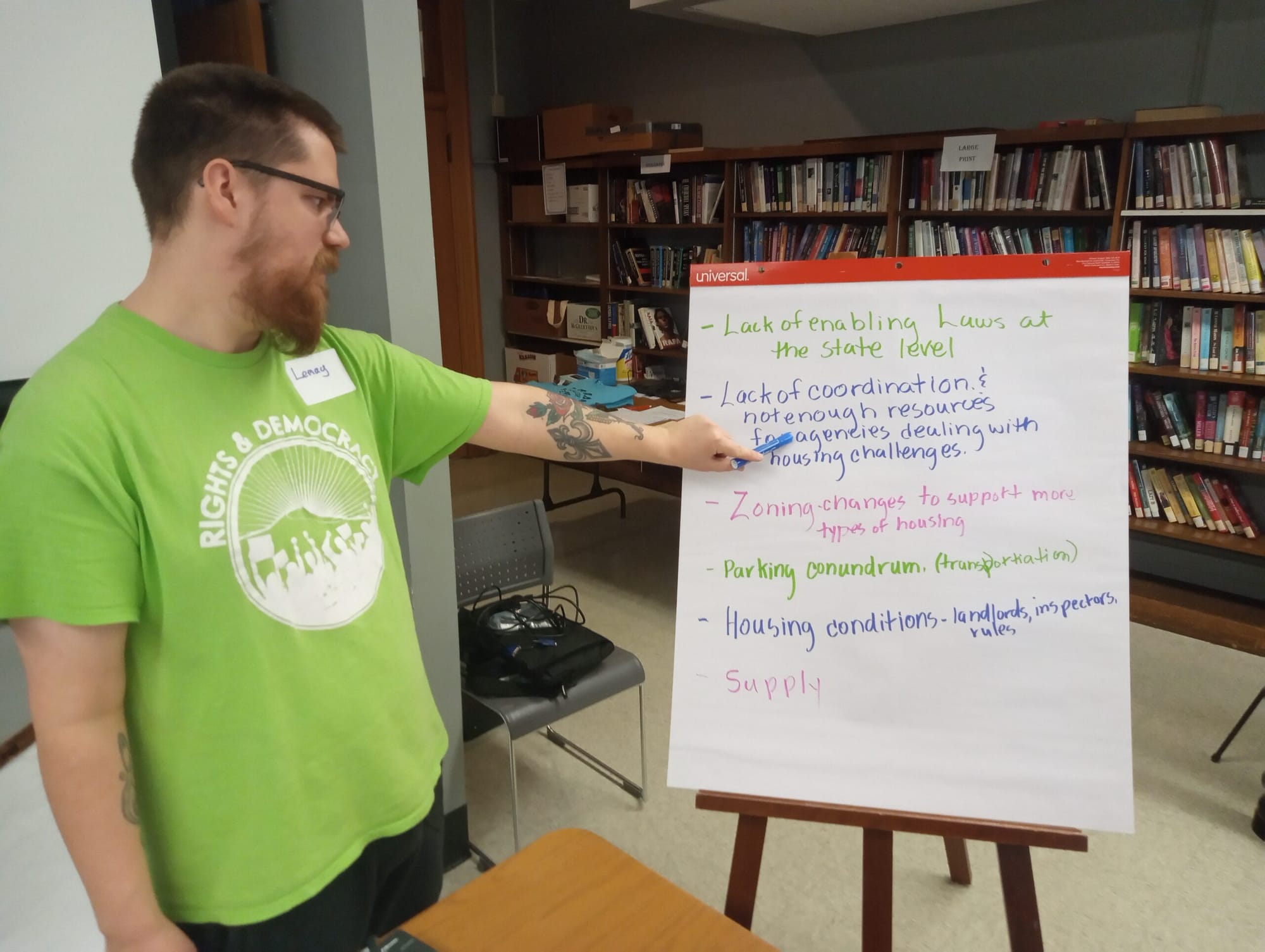
In order to afford rent at one-third of a household’s monthly income, that household would need to make $5,292 a month or $63,504 a year. A single income would need to make 33 dollars an hour, while two people working the same schedule would need to make $16.53 an hour.
The situation is bleaker for one-bedroom apartments, in which a high salary is required to afford an apartment, many of which cost more than existing mortgages for houses. Those who become homeless and/or lose their job find getting a place to live difficult. Those who wish to move within the city find a multitude of applicants applying for those few openings that are available- a number called vacancy rate, which sits at historically low numbers.
While efforts are underway to provide affordable housing, such as renovation of an old police station at 351 Chestnut Street the problems of stagnating wages and high rents will continue to collide as rents become less affordable than ever as a significant driver of inflation.
“Almost half of the people in the city are renters,” said Kathy Staub, a resident of Ward 5, member of the Manchester Housing Alliance and NH State representative for Hillsborough’s District 25. “So it is a big issue here in the city.”
The Manchester Housing Alliance, which also consists of activist and political candidate Brandon Lemay, author Jane Haigh, disability rights advocate Vanessa Blais, and newcomer Kevin Crisciane, have made it their mission to work with city officials toward solving the housing crisis.
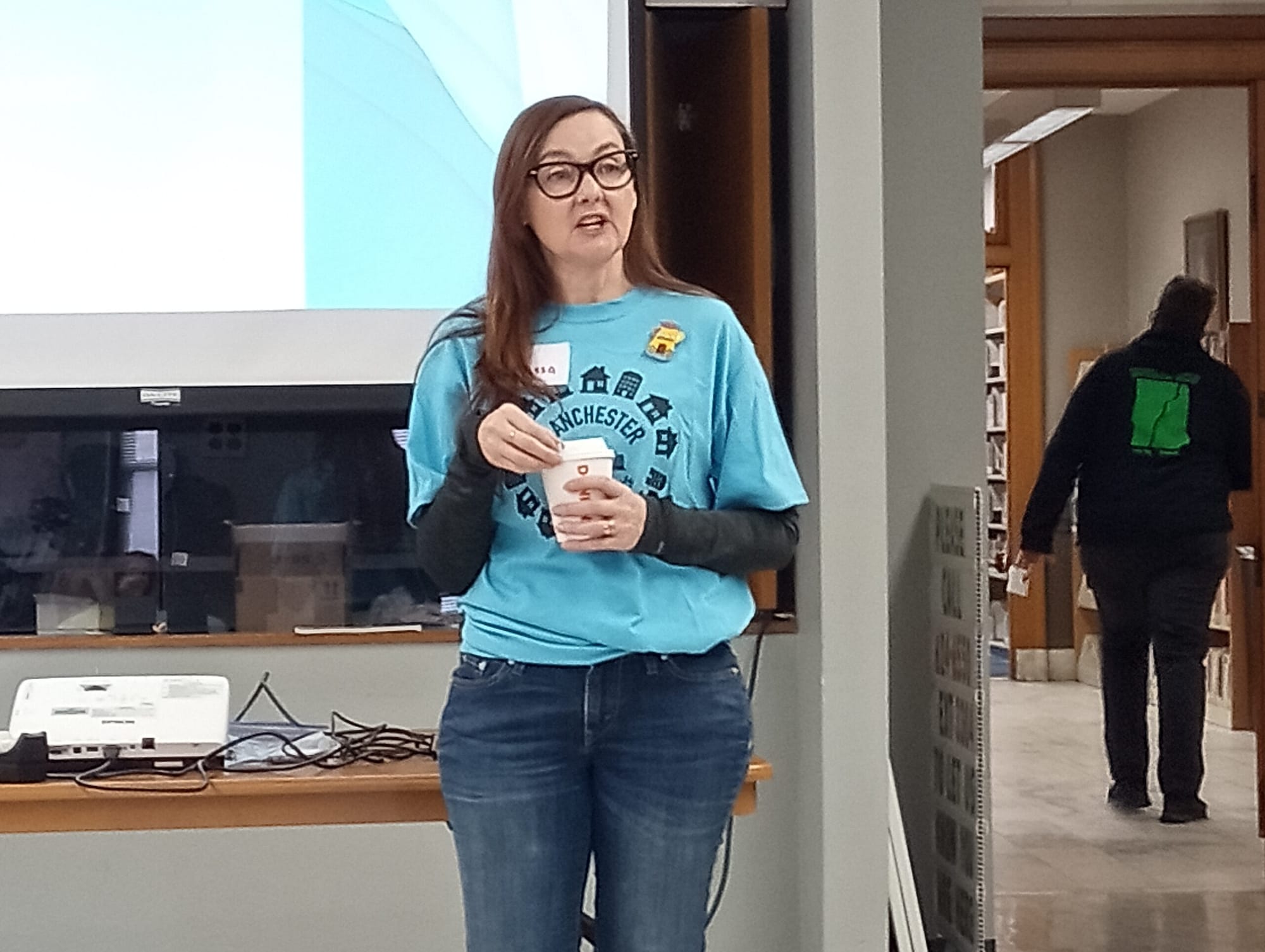
While a variety of new projects have been proposed and have broken ground, many of these are workforce housing or market-rate housing. These are out of reach for disabled workers, retired senior citizens, and homeless veterans.
A bill proposed in the state house in 2022 would make it easier for municipalities to fill in the missing middle of housing. The bill was declared “inexpedient to legislate,” effectively killing it off. Both the state of New Hampshire and the city of Manchester have historically prioritized single-family homes at the exclusion of everything else.
Such priority takes form in exclusionary zoning practices. Because most residential areas are zoned for single-family homes, developers who would like to invest hundreds of millions of dollars in an apartment building must go through the city’s planning board. This requires additional time and expense. Those who wish to build a multi-family home, such as a duplex, must allocate two parking spaces for each unit. This may prove infeasible given a lack of space in the city. Many houses in the city have only a single driveway, or none at all.
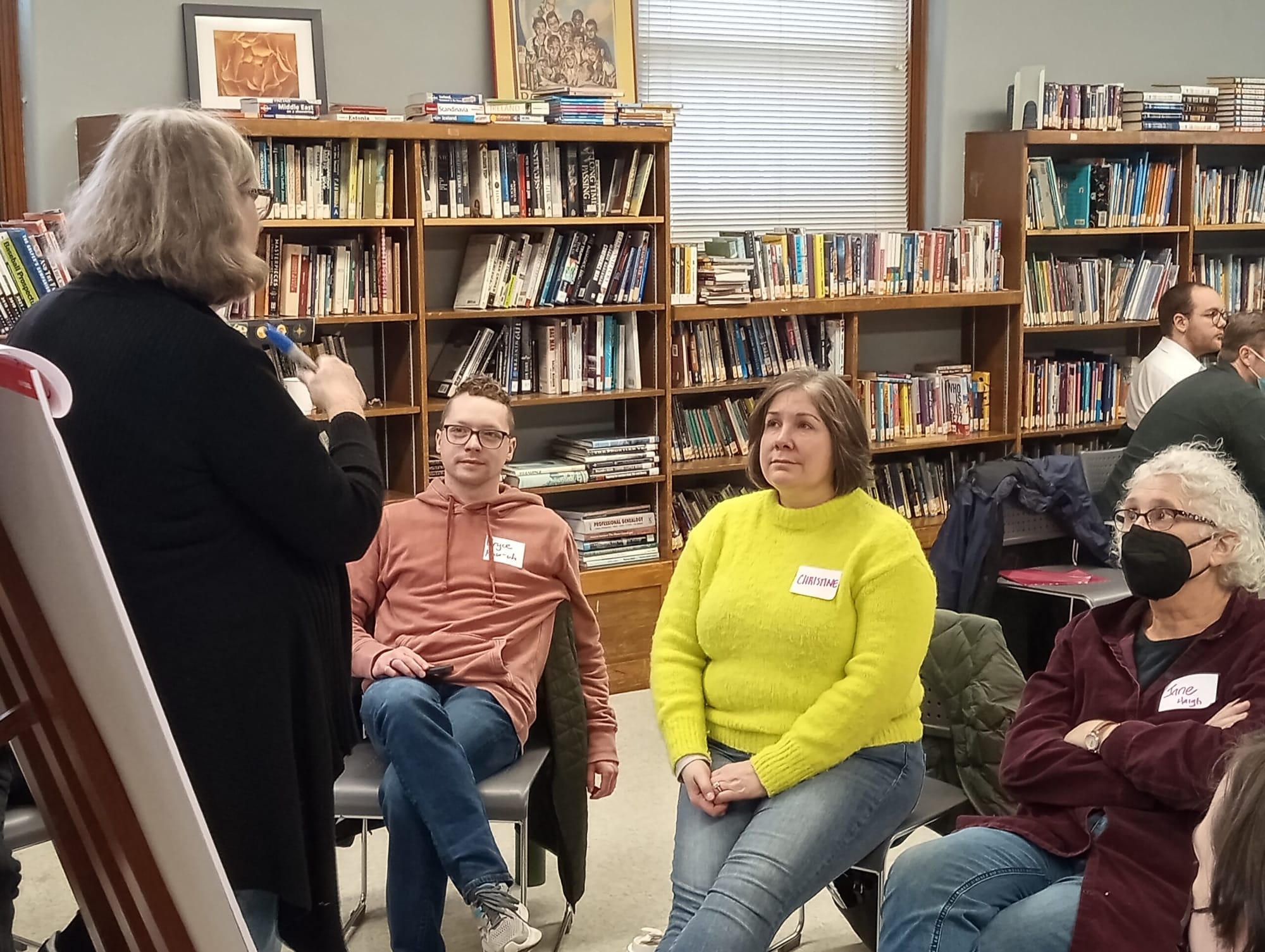
Developers who build or renovate in a district not zoned for residential use are ineligible for certain grants and 79-E tax relief set aside for that purpose, such as Craig St. Pierre, who invested a significant amount of his own money into providing affordable housing. He had developed on the wrong side of Pine Street.
Additionally, concerns were raised in the meeting that public transit, run by the Manchester Transit Authority, is insufficient for the city’s needs. While the MTA operates 13 or more buses at any given time, including a free bus called the Green Dash, they were criticized as not being reliably on time and not going where people needed them to go. The buses also do not run on federal holidays, during which many passengers still have to report for work in the morning, such as those who use MTA’s number 3 bus to work at the Manchester-Boston Regional Airport.
Participants at the meeting were invited to discuss with one another problems surrounding housing in the city. Among the topics discussed were:
- Lack of enabling laws at the state level
- Lack of coordination and not enough resources for agencies dealing with housing challenges
- Zoning changes to support more types of housing
- Parking conundrum (transportation)
- Housing conditions: landlords, investors, rule
- Supply
- Affordability
- Discrimination against marginalized people
- Incentives for builders / developers
- Weak / no collective bargaining structure for tenants
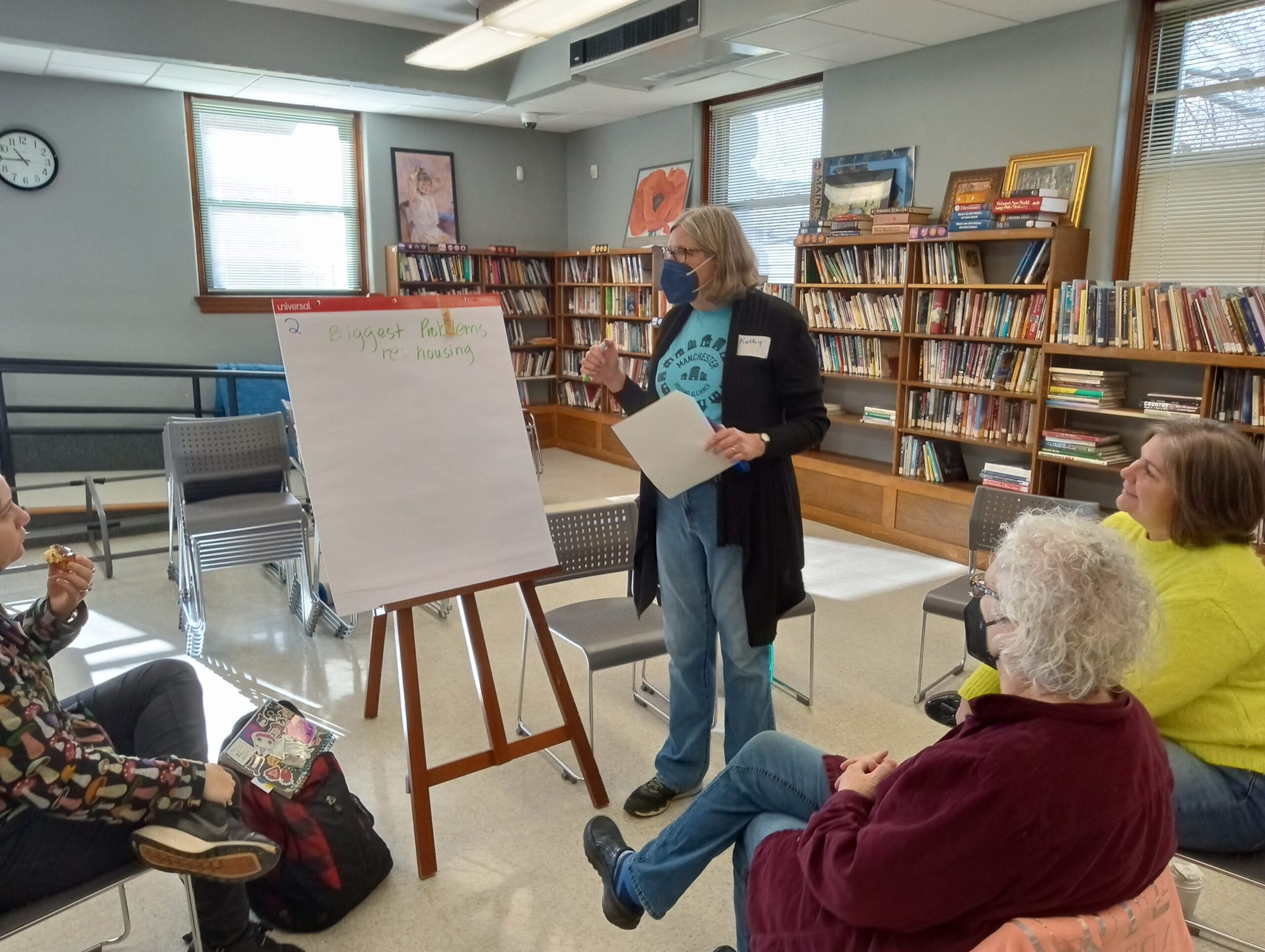
Tenant bargaining struggles often take root from a landlord evicting or refusing to renew the lease of anyone who may cause unfavorable situation for them. The property owner, at his own discretion, evicts anyone in any unit for unit renovations. This process is colloquially called “reno-viction” A tenant who goes to court to challenge an eviction notice may not be able to afford a lawyer. If not, they are tasked with representing themselves against experienced and well-funded law firms who typically win their cases.
Another problem posed by the housing crisis is Manchester’s aging housing stock. Exposure to lead paint has been a problem in recent years, with the city having the state’s highest rate of children with elevated levels of lead exposure. Many of the city’s buildings were not built to the current standards of federal disability guidelines; renovating the building to bring it up to code can prove prohibitively expensive.
In her position as Ward 4 alderman, Christine Fajardo would like to see new units built in addition to older units reformed.
“There’s not enough, at any level,” Fajardo said. “We often hear criticism around market-rate housing. We need that too. We need to focus on affordable housing and low-income housing. My pipe dream would be to create an environment where, for each new unit we bring online, we also rehab an existing unit. Improving safety, wellness, just improving living conditions and quality of life improves your income and health outcomes too. We definitely have an inventory crisis, but with our current existing stock of housing, I think there’s a bit of a less-spoken-of crisis there.”
The Manchester Housing Alliance holds its next regular monthly public meeting on February 5 via Zoom. Details can be found on their Facebook page .





